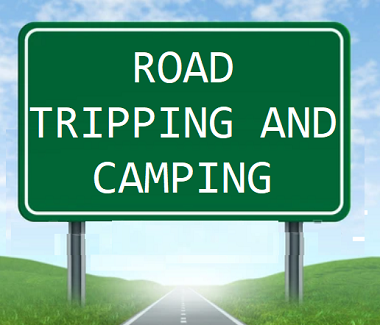Backpacks for Hiking and Camping
If you are road tripping and not going on hikes you may not need a back pack. But, if you are going to be walking or hiking any distance at all, you will most definitely want (and probably need) a backpack. They are specific to your needs and the type hiking you are doing!
Backpacks for short hikes
Let's say you go to an amusement part, or a national monument like the Statue of Liberty, you'll need something to comfortably carry:
- water bottles
- extra sunscreen, possibly deet
- snacks
- jackets and or hats
- extra items for your kiddos
- shopping items or souvenirs you may pick up
A small backpack is fine for that. Available at Wal-Mart, Costco, Sam's Club, Target, REI, Cabella's, Dick's etc. There are just lightweight packs like your kids take to school and college students use.
Backpacking and camping backpacks
The type and size backpack you'll need for hiking and camping depends upon the distance you'll be going and how much gear you plan to take.
Size: How big do you need?
In choosing a backpack size, it is your torso size that matters, not your height. It has to fit and feel comfortable. Going big on a small torso will not work. If you are uncertain, go to an REI store. They will assess your fit needs and work through them with you, under no obligation to buy (unless you easily succumb to sales pressure)..
30 to 50 liters is the smallest typical hiking and camping backpack. It is suitable for 1 or 2 days trips and especially for smaller adults and children. Inside the pack, you'll be able to fit a sleeping bag, clothes, cook gear, some food, etc. And the bottom outside of the back has straps for either a roll-up mattress OR tent, but not both.
60 - 80 liters is more suitable for 3 days plus. Key is checking on straps on the outside to attach bulky items like tent and rolled-up mattress.
Summary:
- 50 L - for children and adults under 5 ft and/or small torsos.
- 60 - 70 liters is a good size for weekend trips,
- 70 - 80 liters best for 5 day and longer trips or shorter trips with lots of gear
(like when dad must be the pack mule for the family)
Frames
Basically, there are 3 types of hiking/camping backpacks:
- Backpacks with frames built into them
- Frameless backpacks
- External-framed backpacks
Frameless: left to right, 50L, 60L, 70L, 80L
Click here for this item on Amazon
Click here for this item on Amazon
Frameless Backpacks
These are really only best for children and very small adults.
Pros
- Very light weight,
- Inexpensive
- Can be folded up to a very small size when not in use.
Cons:
- They are much more uncomfortable under heavy loads than packs with a frame.
- Can be hotter and lead to a sweaty back since they fit so snugly.
Internal frame backpacks
Left to right: 55L, 60L, 65L, 70L, 90L
Click here for this item on Amazon
Click here for this item on Amazon
Click here for this item on Amazon
Click here for this item on Amazon
Click here for this item on Amazon
Internal Framed Backpacks
Pros
- Most backpacks with internal frames hug the body snugly and
have straps and extra padding which helps to keep you stable on uneven trails. - There are many models and makers, so their is huge selection and styles.
- Some have integrated rain covers
Cons
- Can be hotter and lead to a sweaty back since they fit so snugly.
Premium Internal Frame Backpacks
Premium internal frame backpacks
Left to Right: 90 L , 65L
Click here for this item on Amazon
Click here for this item on Amazon
Some of you seek to impress with a premium backpack. Who am I to judge. Here they are:
First, a 85 Liter frameless backpack with solar panels to recharge your devices.
External-framed backpacks
These have a lightweight frame, usually aluminum, that supports and distributes the backpack.
Very often, you purchase the frame and backpack separately and the frame can handle almost any backpack or duffle bag.
External Frame Backpacks
Left to right. Frame only, Frame only, 68L-with-SolarPanels, 90L-Frame+pack, 90L-Frame+pack
Click here for this item on Amazon
Click here for this item on Amazon
Click here for this item on Amazon
Click here for this item on Amazon
Click here for this on Amazon
I've been using one I got at Costco in 2000 that works great and will probably last 100 years of more. It has both the external frame and integrated backpack. But these are getting hard to find.
Pros
These are incredibly flexible, since you can strap almost anything to them, and size or dimension.
They distribute weight very well and are very comfortable.
Cons
Aside from their large size, which can be argued is actually an advantage, only their additional expense.
Nice or Useful features
- Ventilation - Some backpacks have ventilation channels called "Chimneys" or a suspended mesh back panel to help avoid a sweaty-back
Accessories
- Waterproofing or rain covers - Packs come in different levels of waterproofing, but even with the best of them,
rain can seep through seams and zippers, and even the exterior fabric can absorb water (and therefore weight) over time.
So a plastic or vinyl rain cover is usually a good idea. And it can be purchased separately as an accessory. - Solar charger:
70W Foldable Solar Panel Charger (5V USB with SolarIQ + 18V DC+ Parallel Port) Compatible with Notebook, Portable Generator, car Battery, Cellphone, Tablet, and More
